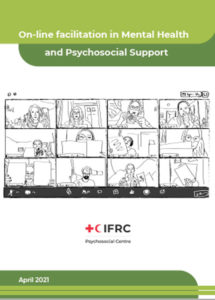“We wanted to share what we found out worked best in trainings. We first thought: how can you transform the face-to-face into online, where you take the same elements that we usually work with in mental health and psychosocial support.” – Ea Suzanne Akasha.
The newly published “On-line facilitation in Mental Health and Psychosocial Support” guide reflects and builds on experiences from the IFRC Reference Centre for Psychosocial Support with conducting its participatory on-line MHPSS trainings. The guide offers tools on how to transform participatory and scenario-based face-to-face trainings to a digitally inclusive experience. It is written to encourage the use of online trainings that enhances the learning outcomes for participants combining technical skills with social-emotional learning.
Ea Suzanne Akasha, technical advisor at the IFRC PS Centre and author of this guide, reflects on the major differences between the two forms of training, as well as tips and tricks that trainers can use to create a more interactive on-line training for their participants.
One of the key differences between the two forms of trainings is that virtual trainings do not give room for improvisation. As Akasha emphasized, trainers can often adapt to their physical settings. However, online trainings require the trainers to pay more attention to details and use more time on preparing and planning for each training session.
“Improvising online is much harder. You need to have everything planned. It takes much longer to know exactly how long things will take and exactly when to give break. You need to give people enough breaks. So, the main takeaways are that even though the online trainings can come very close to the real thing, the important part is the planning and the planning ahead. That’s where a major part of the work actually lies.” – Ea Suzanne Akasha.
According to Ea, short lectures are especially preferred in on-line trainings. She suggests using simple keywords to guide participants through each lecture rather than using long and often complicated PowerPoint slides. She generally discourages the use of PowerPoint presentations, as they increase the risk of losing that important connection between the facilitator and participants.
“Learning is something that is done through the senses. Being in the room with somebody, even if it is on-line, can make you feel them and connect with them. This is what we want to achieve: connectiveness between people.” – Ea Suzanne Akasha.

